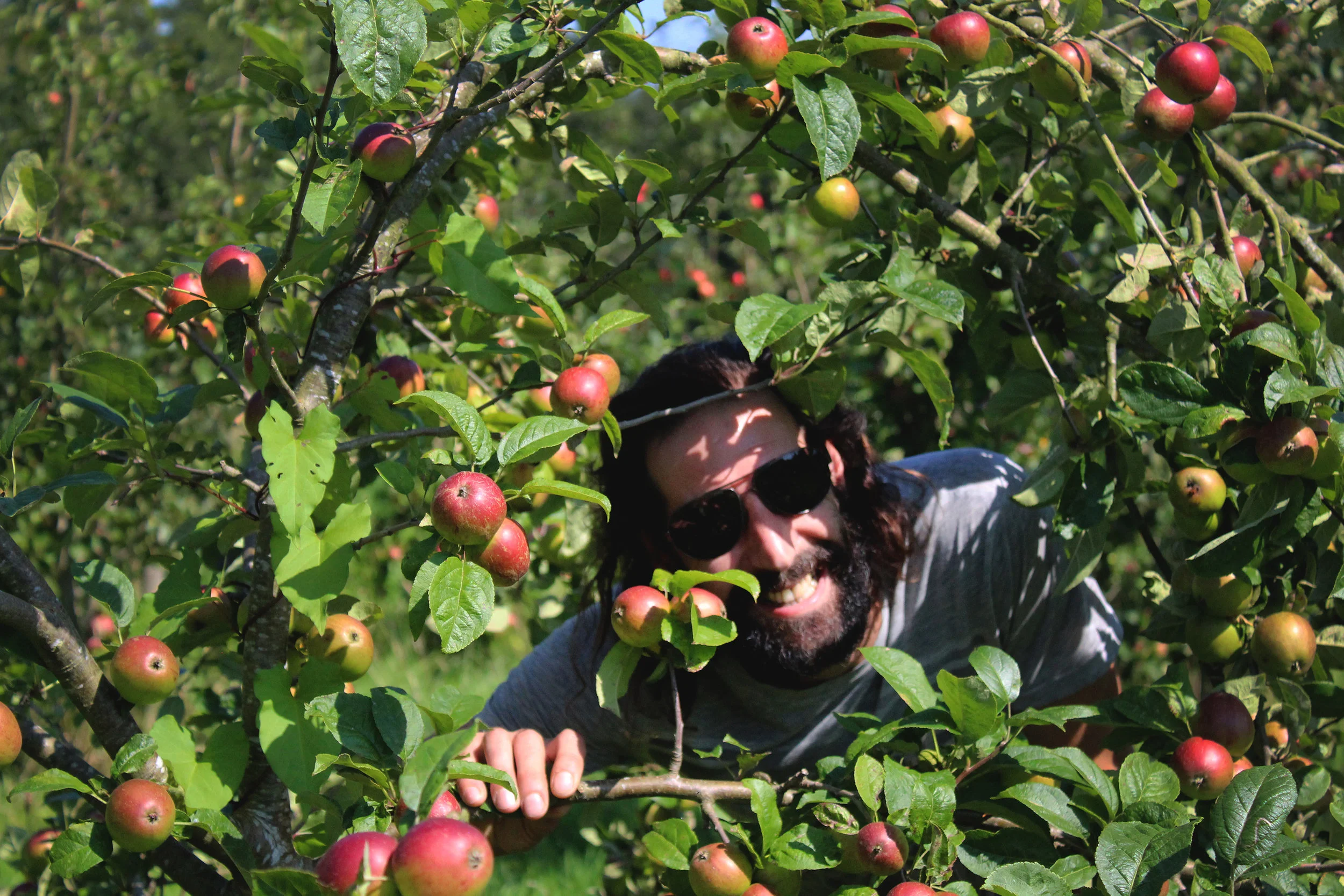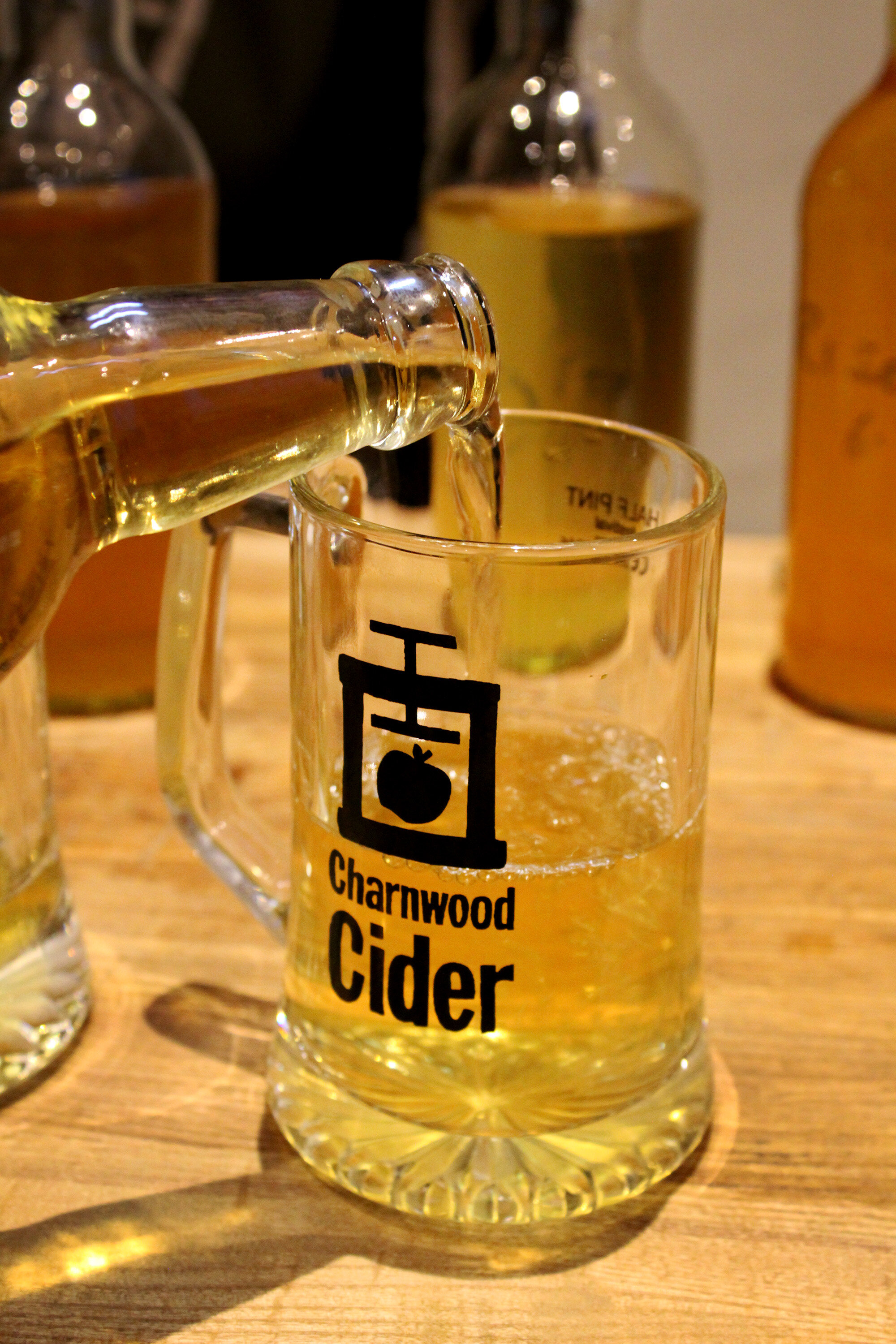Floating on a Rising Tide — Charnwood Cider’s Triumph over Adversity
You could forgive Leicestershire low intervention cidermaker Rob Clough for wanting to throw in the towel. A serious flood in March 2019 wiped out the main barn at Charnwood Cider, destroying some 4500 litres of its product. Strolling down the lane to his cider barn, his jaw dropped as he saw water pouring into the farm’s courtyard. Over a metre of water encroached upon the buildings.
Photography by Laura Hadland
To make matters worse, on the day we'd originally arranged to take the photographs for this article, a prolonged sneezing fit sent a BMW driver careering across the road into Rob's path. The accident wrote off Rob's faithful old white pickup truck—right before apple harvest was to begin.
But nothing keeps Rob down. An easygoing, jocular man with a quiet charm, he takes everything in his long stride.
“Life is a challenge,” he tells me. “How you deal with the challenge is the important thing.”
As a result of the flooding, much of his 2018 harvest was deemed unsaleable, but a smaller barn containing 1500 litres thankfully remained intact. Here, Charnwood Cider's more interesting small pressings slumber. They are the carefully guarded outcome of pressing and fermenting distinct varieties of apple or a special orchard’s fruit individually.
Notably, there are the remains of a batch from Mount Saint Bernard's Abbey, also in Charnwood, pressed under the watchful eye of the monks themselves. They are the brewers of Tynt Meadow, the UK’s only Trappist beer. Brother Martin tells me that their apple trees date back nearly 200 years, to the foundation of the monastery. They were planted to aid the monks’ self-sustainability, but now produce a surplus of unidentified varieties of apples. The monks have enjoyed the 160 litres of cider that was returned to them, the first made with their apples.
***
Rob's cidermaking started as a pleasant diversion with friends. Facing a marked lack of diversion in the wilds of rural Leicestershire, they experimented with country wine and brewing kits. Noticing a neglected apple tree in a neighbour's yard, the enterprising group asked permission to use the fruit and took their first tentative steps in making cider.
This awakened a new passion for Rob. He began scouting the area for apple trees. Strangers' doors were knocked upon, asking for fruit in exchange for some of the cider he would produce. Rob made many contacts in those early days that he still uses. The landowners rarely know which varieties are grown in their orchards, but Rob has now learned what flavours each orchard will produce.
Emma Jansen met Rob through a mutual friend who knew about the orchard on her property in nearby Cropston. She has been donating her apples to Charnwood Cider for several years. There are too many apples for her to use, so she is glad they are not wasted.
“Every year he fills his van and off he goes” Emma smiles. “It’s something quite special, isn’t it? To drink cider that was grown in your garden. It tastes lovely too—nothing like one off the supermarket shelf.”
Charnwood Cider went commercial in 2010 when annual production reached 1000 litres. It was too much to drink privately, even when shared with enthusiastic friends. Plus Rob could smell a challenge—an opportunity to turn a rewarding hobby into a business—and the chance to one day leave his day job as a park ranger and become his own boss.
Obtaining cuttings from the Ross on Wye Cider & Perry Company, Rob began grafting his own trees. He bought a field not far from Stoneywell, Leicestershire’s only National Trust property and planted 300 trees there. They are classic cider apple varieties, including Dabinett and Somerset Redstreak. In 2019 these trees are beginning to mature, and this is giving Rob a whole new palette of flavours to work with.
As Albert Johnson from Ross on Wye explained to me, Rob’s request for graftwood was an unusual one, because access to orchards and land is a great challenge for the cider industry.
“Nobody is planting trees,” he tells me. “For the last few decades, the only people who could afford to make cider were those who already had financial security. The burden of access to apples and transporting them to somewhere they can be made into cider is a heavy one.”
Rob’s love of the outdoors inspired him to break that mould. This love permeates every aspect of his professional and private life. The physical work of cidermaking and orchard management is clearly a joyful pursuit for him. He regards nature as the orchestra and himself as the wild-haired conductor. It is a point of personal pride to use 100% apple juice to create an authentic product that speaks of the land where it grows. He is a passionate devotee of full juice cider.
““Life is a challenge. How you deal with the challenge is the important thing.””
You can detect the merest flash of anger in his mellow countenance as he tells me about commercial producers playing fast and loose with definitions. In the UK, a drink can be as little as 35% apple juice and still be legally labelled as cider.
“Full juice is about the intention of the producer to aim high from the start,” Mark Shirley, a retired producer formerly of Rockingham Forest Cider, tells me. “In my view, nobody ever made truly great cider by starting from a position of cutting corners and stretching the juice out with water. That’s a purely commercial decision.”
Mark speaks highly of Rob's products, calling them “a good expression of the local fruit he uses.” Mark likes Charnwood Cider because they don’t ape West Country styles, but are uniquely East Midlands: packed with fruit and sharp.
“Terroir is as important to real cider as it is for wine, or it should be,” Ross on Wye’s Albert Johnson says. “The unique climate and soils of Rob's orchard gives his cider a unique character—this is something really important in cider, where we are still trying to explain to consumers that cider is meant to be seasonal and varied.”
***
The real skill of cider making is in the blending. Making cider is a tough, manual job; pure and simple. It takes no particular skill to press an apple and leave it to ferment. However, making a well balanced, delicious cider is a true craft. It requires a deep understanding of the characteristics of the apples.
Rob leads me through a private lesson in his art. His eyes are animated as he talks confidently about the shining amber liquids on the table before us. He made this table too, using locally felled wood. Everything connected with Rob has a pleasing artisan feel, including the varietal names hastily scribbled on unlabelled bottles.
I taste some of Charnwood Cider's precious new single variety pressings. The powerful, flavour explosion of the historic Foxwhelp variety knocks me sideways. The apple flavour is so strong it feels concentrated. The bitingly high acidity and soft tannin give it a unique character.
Then, with the clinking of glass, Rob skilfully moderates its sharpness with the tannic bitterness of Ellis Bitter, followed by a dash of the sweet Cocky Fox made with Cox's apples to create a beautifully balanced thirst quencher. The characters of each variety are discernible but the whole is more delicious than its parts. The crisp, refreshing beverage is easy drinking, belying a dangerously high ABV, incubated in the intense sunshine of 2018's record summer.
Another blend, the 6.7% Rise Up is a cider with a luxuriously soft body that feels like velvet on the palate. The soft tannins are complemented by vanilla and citrus notes and a light, well-balanced acidity.
The eccentricity that is the lifeblood of Charnwood Cider is also reflected in the names of its ciders. Rob tells me that Golden Dawn and Rise Up are named for the Planet of the Apes films. Golden Dawn is also a nod to the eponymous song by South African rave-rap group Die Antwoord. Like them, Rob's ciders are contemporary, idiosyncratic and enjoyed by those in the know.
As we shoot the breeze, Rob absent-mindedly scratches Marley's head. The gentle border collie is the other love in Rob's life and the two are rarely seen apart. Marley is a familiar face at Leicestershire’s Bradgate Park, where Rob has worked as a ranger for nearly 15 years. Recently going part-time, he now aims to leave the job altogether to concentrate on his cider and another project—The Mash & Press micropub.
***
Situated in the quiet village of Anstey, The Mash & Press began as a pop-up created by Rob and local brewer Stuart Slessor. Now they have a thriving, permanent venue above Stuart’s Anstey Ales brewery. It’s easy for the uninitiated to miss the entrance, tucked behind a local newsagent in an anonymous residential street. Situated in a repurposed industrial unit, the bar is reached up a narrow white-washed concrete staircase. More often than not, Marley rushes to welcome new punters with a friendly sniff and a wag of the tail.
The micropub is kitted out with Rob’s handiwork: rough wood panelling and hand-crafted furniture. The atmosphere is always jovial and cosy, mainly frequented by locals from the village. Increasingly though, the Mash & Press is luring full juice cider devotees off the beaten track to the suburban stillness of Anstey.
The micropub gives a platform to hyperlocal drinks producers. Anstey Ales, Charnwood Cider and Rothley Wine Estate are the main suppliers, all located within three miles of the pub. The flood took many of Rob's bag in box ciders off the bar, which encouraged him to stock other local producers sooner than anticipated. It’s home to one of the biggest ranges of real ciders in the region. Charnwood Cider’s Charny Sparks keg cider is the latest thing to turn heads.
“It's amazing how many people I've forced to try my cider,” Rob says with a laugh. “Well, I don't quite pin them to the floor and pour cider down their throats. But after the first reluctant sip, they're hooked!”
Rob's evangelical practices have not gone unnoticed, either. Ray Blockley of the award-winning Torkard Cider and Nottingham CAMRA's Cider & Perry Officer tells me how the Mash & Press is “helping to give something back to the region and promoting other makers of low intervention whole-juice real cider & perry.”
The 2019 harvest has been good; Charnwood’s young trees were heavy with fruit on my visit. After the hardship of the flood, Rob is now feeling confident about the future. His cider barn is cleaned and repainted. Pressing of this year’s harvest has begun in earnest. It is an invigorating time for cider lovers in Leicestershire. Now he just needs to find a new truck.























